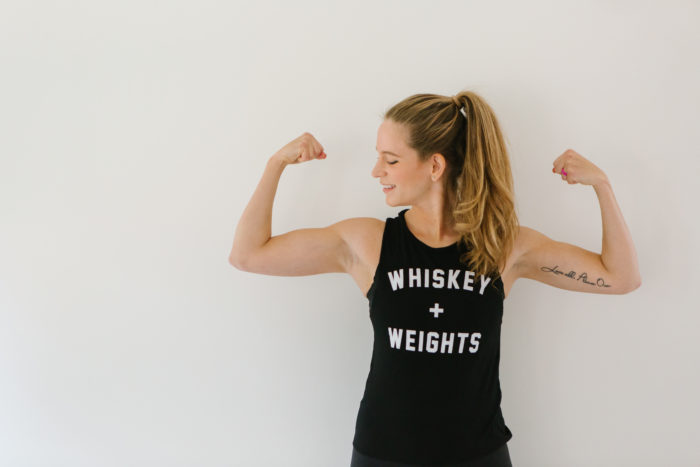This post may contain affiliate links.
When you learn to stop focusing on the number on the scale you can you’ll find that health is about so much more than your weight.
Today, the scale – and whatever number shows up when we step on it – has become the primary measurement of health. Not to mention our self-worth.
But in reality, this is complete BS. It is possible to be healthy and “overweight”.
Health is a combination of so many factors. This includes the food you eat, how much you exercise, your relationships, and how you feel about yourself.
Don’t get me wrong, feeling good in your body is important. And weight loss goals are not necessarily bad to work towards.
But we can get so caught up in the number on the scale we lose sight of why we’re even trying to lose weight in the first place. (Or if it’s even healthy for us to do so.)
In this blog post, I’ll walk you through:
- Lifestyle and health factors that can indicate a potential benefit to weight loss
- Non-scale ways to measure progress on your weight loss goals
- My new way of approaching weight loss and health
If you’re ready to stop focusing on the scale and start living fearlessly in the pursuit of a healthy, meaningful life, keep reading!

IS Weight Loss is Appropriate for You?
Pursuing weight loss isn’t appropriate for everyone.
And if your body isn’t in a place to lose weight, you can end up doing some serious damage to your body’s metabolic and reproductive health.
The difficult part about deciding if you should pursue a weight loss goal is figuring out if it would be safe and healthy for your body to lose weight.
Just because you’re unhappy with that number on the scale, doesn’t mean that it’s guaranteed you have weight that would be healthy to lose.
Today’s society has conditioned us to believe that skinny equates to healthy. And that the lower that number on the scale, the better. This just isn’t true.
Instead of looking to the scale to determine if weight loss is appropriate for you, here are some other ways to determine if losing weight is a potentially healthy goal for you to pursue.

If Your Metabolic Markers Are Off
Metabolic markers are measures of health that have been shown to predict certain chronic disease states.
When we’re talking about these markers of health, we’re mainly looking at things like:
- blood glucose levels
- triglycerides
- high-density lipoprotein cholesterol
- blood pressure
- waist circumference
These ways to measure metabolic health are more accurate at predicting future health status than the number on the scale.
Instead of just telling us how much we weigh, these markers can indicate our likelihood of developing certain conditions, like heart disease or diabetes, in the future.
If you’re metabolically healthy, you likely don’t have chronic conditions that can cause ill health. And you’re less likely to develop them in the future.
But if one or more of your metabolic markers are off, you could face some health challenges in the future.
In people who are overweight, losing weight can help to normalize these markers and improve health in the long run.
The amazing part is that you may not even have to lose much weight to have a complete reversal in your disease risk.
As an example, one study found that 90% of people who reduced their body weight by just 10 percent within 5 years of being diagnosed with diabetes were able to achieve remission from the disease.
You don’t need to have a Biggest Loser style weight loss experience to achieve noticeable improvements in your health.

If You’re Physically Handicapped By Extra Weight
Being able to run around the house after your kids or taking a hiking trip with your husband is far more valuable than any number on a scale.
Living your life exactly the way you want is one marker of health that far outweighs whatever you see on the scale. (No pun intended!)
A life that is truly Fed and Fearless™ is one that values meaningful interactions and the pursuit of purpose over looking like the fitness guru on Instagram.
But if you’re finding that your weight is getting in the way of you being able to comfortably move your body, weight loss might be an appropriate goal for you.
Getting winded walking up the stairs, needing to sit and rest while playing with your kids, or skipping out on a hiking trip for fear of not being able to keep up are all signs that your health, and possibly your weight, is negatively impacting your life.
Those clients that I’ve worked with on weight loss goals typically have some kind of physical challenge created by the excess weight they are carrying. This could look like knee or back pain, shortness of breath, or having trouble sitting comfortably in a seat.
It’s less about what they look like and more about how they feel.
If your weight is keeping you from living the active and engaged life you desire, it could be time to focus on a weight loss goal.

If You’re Experiencing Aches and Pains
A common complaint I hear from women who desire to lose weight is the physical pain they’re experiencing in their bodies. Often, their feet, knees, and back are all being stressed by the extra weight they’re carrying.
Carrying excess weight can cause joint pain and can wear away the cartilage in between your bones. This can make even the smallest of movements painful.
Losing a modest amount of weight takes some of the excess pressure of your joints. This can make moving pain-free once again.
In fact, each pound of weight loss can reduce the load on the knee joint by 4 pounds. And for women who are overweight, every 11 pounds of weight loss reduces the risk of knee osteoarthritis by more than 50 percent.
You read that right. If you’re overweight, losing just 11 pounds total will reduce the load on the knee by 44 pounds. With this modest amount of weight loss, you’ll also cut your risk of arthritis in half!
It doesn’t take a ton of weight loss to see some benefit.
So if you’re overweight and experiencing chronic joint pain, losing a modest amount of weight could drastically improve your quality of life.

Measuring Progress Without the Scale
Say you’ve determined that weight loss is an appropriate goal for you in this season of life. Now what? You might be thinking you can’t possibly stop focusing on the scale now.
The good news? You don’t have to weigh yourself to work towards a weight loss goal.
Just like you were able to determine if weight loss was appropriate for you by looking at your symptoms and how you feel, you can do the same to measure your progress towards meeting that goal.
This means you can stop focusing on the scale as your main means of tracking progress. And instead, you can use other, more meaningful, factors to measure progress.
This can feel difficult when you’re pursuing a goal to lose fat or even just alter your body composition. After all, scale weight is an indicator of whether or not you’re moving in the right direction.
And for those who can look at the scale neutrally, it’s just a data point to tell you if you’re moving in the right direction.
But the number on the scale doesn’t tell us everything about how your health is improving.
Other markers of health, such as your energy level or your ability to move your body freely, are more meaningful and impactful to your life in the long run. And hyper-focusing on the scale leads many women to ignore those other improvements.
Making that Mindset Shift
To stop making the number on the scale the main focus of your weight loss endeavors is hard. This is a major mindset shift that generally does not happen overnight.
It requires you to reframe the way you think about your body as a whole, not just how it looks.
And it forces you to pay attention to how your body feels. This is more challenging than just tracking a number every morning… but so worth it!
The process of learning your body is incredibly beneficial to your long term health and happiness.
Here are a few scale-free questions to ask yourself that can help you track progress in a weight-loss goal.

How Do Your Clothes Fit?
How your clothes fit is a great indication of body composition change that won’t have you fixated on a number. Especially because you can lose body fat, gain muscle, and overall improve your health, and see no change on the scale.
Say your goal is to lose body fat around your midsection. Instead of hopping on the scale every morning, just notice how your jeans are fitting. (Caveat: don’t ask this right after washing your jeans!)
You likely won’t see any drastic changes from day-to-day. But by focusing on living a healthy, meaningful life, instead of focusing on your progress on the scale, eventually, you may notice your jeans are fitting a little looser.
We all go through regular weight fluctuations that have nothing to do with our body composition. Things like hormonal fluctuations, gut function, and stress all affect both the size and weight of our body on a daily basis. (The average poop weighs around a pound or more!)
By not focusing on the scale as a measure of progress, you’re freeing yourself from the daily mental battle that comes with tracking these changes. Changes that are essentially meaningless when it comes to your overall goal.

How is Your Energy Level?
An increase in energy levels throughout the day is often a natural byproduct of positive body composition changes.
Whether you’re trying to shed excess body fat, or beef up your muscles, you’ll likely see an energy boost when you’re on the right track.
Instead of fixating on the number on the scale, try to focus on how energetic you feel on a daily basis.
Are you able to play outside with your kids for longer stretches of time? Can you now take a walk with your girlfriends without feeling out of breath?
Many of my clients benefit from giving themselves a rating on a 1-10 scale for energy and comparing those numbers as time goes on. If you started at a 5/10 on that energy scale and a few months later are feeling at an 8/10, that’s a huge improvement!
Being able to energetically engage with life is so much more meaningful than what you see on the scale.
And when you begin to understand the value of pursuing a healthy, meaningful life, rather than fixating on a weight goal, it makes ditching the scale that much easier!

How Are You Sleeping?
Improvements in sleep quality and quantity are often a result of improvements in your physical health. And for some people, they can be directly impacted by weight loss.
When your body is healthier, your body is better able to produce healthy hormones. And healthy hormone production often leads to better sleep.
For those with larger amounts of weight to lose, modest weight loss can reduce the risk of snoring, sleep apnea, and hypoventilation at night.
As these conditions improve, sleep quality and duration improves as well. And the more sleep you get, the easier it is to lose weight.
It can become an upward spiral of improved health and improved sleep, which will greatly improve your quality of life.
If you’re working towards a body composition goal and find that you’re sleeping better, stop focusing on the scale. And just simply enjoy the fact that you’re improving your health and your quality of life in the long run.

How Do You Feel About Your Body?
If you know me, you know that I’ve been preaching health over looks for years. And my thoughts about measuring progress in a body composition goal is no different.
Your mental and spiritual relationship with your body is so much more important than a number on a scale could ever be.
Believing that you’re beautiful and worthy, no matter what you weigh, is the essence of being fearlessly healthy.
Learning to love yourself, whether you change your body composition or not, is a critical component to developing a true Fed and Fearless™ mindset.
With that being said, it’s completely okay to want to change your body physically. As long as it’s done out of self-love and compassion, and ultimately leads to better overall health, it’s a positive goal to have. And, losing weight when you stop focusing on the scale is actually easier, and more rewarding than you may think!
When you’re measuring progress by how you feel about yourself as a human, not a number on a scale, you’re setting yourself up for long-lasting success and fulfillment.

Are You Eating Foods You Enjoy?
There’s no body composition change worth completely depriving yourself of all the foods that you enjoy.
If you want your physical changes to be sustainable, you must reach them in a way that doesn’t eliminate all enjoyment from food.
Being able to eat food you enjoy is one way to measure whether or not you’re on the right track to making a change that will truly last.
Plus, when your body is healthier, you can typically enjoy a larger variety of foods without experiencing symptoms like digestive distress. Having better food tolerance is a great sign that you’re making good progress on your health.
And when you can get pizza or ice cream with friends while still improving your health, your results will be far more sustainable than if you have to stick to a strict “diet” to maintain your new physique.
The number on the scale can’t measure your happiness or enjoyment of things like freely eating out with friends and family. Making adjustments to your routine that allow for the continued enjoyment of life is crucial for achieving your weight loss goals fearlessly.

What Is Your Vision for Your Future?
Casting a vision for your future and identifying how your body composition goal fits into it is a great way to measure progress.
This practice can also help you determine if this weight loss goal is truly meaningful to you. You can assess how your goal might help you make a bigger impact in the world around you.
Taking a big-picture approach to goal setting and the progress you make towards your goals is a great way to cultivate a Fed and Fearless™ mindset.
Creating a vision for your future can point you on a clear path. This path can then direct your smaller day-to-day steps and habits.
If improving your body composition and the progress you’ve made so far fits into this larger-scale vision, then that’s a good indicator that you’re on the right track.

My Fed and Fearless™ Approach to Health
In my Fed and Fearless™ approach to health, weight is only a very small piece of the puzzle.
Your health, and your body in general, is NOT your greatest asset. We were created to be so much more than a physical body.
And when the physical is the main focus of our health and wellness pursuits, we’re missing out on so much more that God has created us for!
My highest goal for you is to be able to view your body from a place of self-compassion, and as a vehicle to pursue your greater purpose.
With that in mind, I developed my Five Pillars to becoming Fed and Fearless™.
Developing a fearless mindset around your eating, training, self-care, self-love, and pursuit of purpose will enable you to use your health as a tool to live a life of true joy and to make a meaningful impact in the world around you.
When you approach health from a perspective of self-care and honoring your body, you’re able to stop focusing on the scale and instead start focusing on what really matters to you.
Using these pillars as our guide, our health and fitness goals will stream from that innate desire to care for and nurture our bodies and steward our health, whatever we may weigh.
Join The Challenge
If you’re ready to start honoring God with the way you approach your health, I’ve got something special happening for you at the end of this month!
Introducing the Faith Over Fear: 5 Day Body Confidence Challenge!
In this 5 day challenge, you’ll learn how to replace negative self-talk with faith-focused truth, so you can honor God with the way you care for your body.
Ditch the scale as your source of self-worth and learn how to see your body through God’s eyes, and steward your health in a way that honors the body you’ve been given.
We officially start the challenge the week of December 29th, so sign up now and save your spot!

+ show Comments
- Hide Comments
add a comment